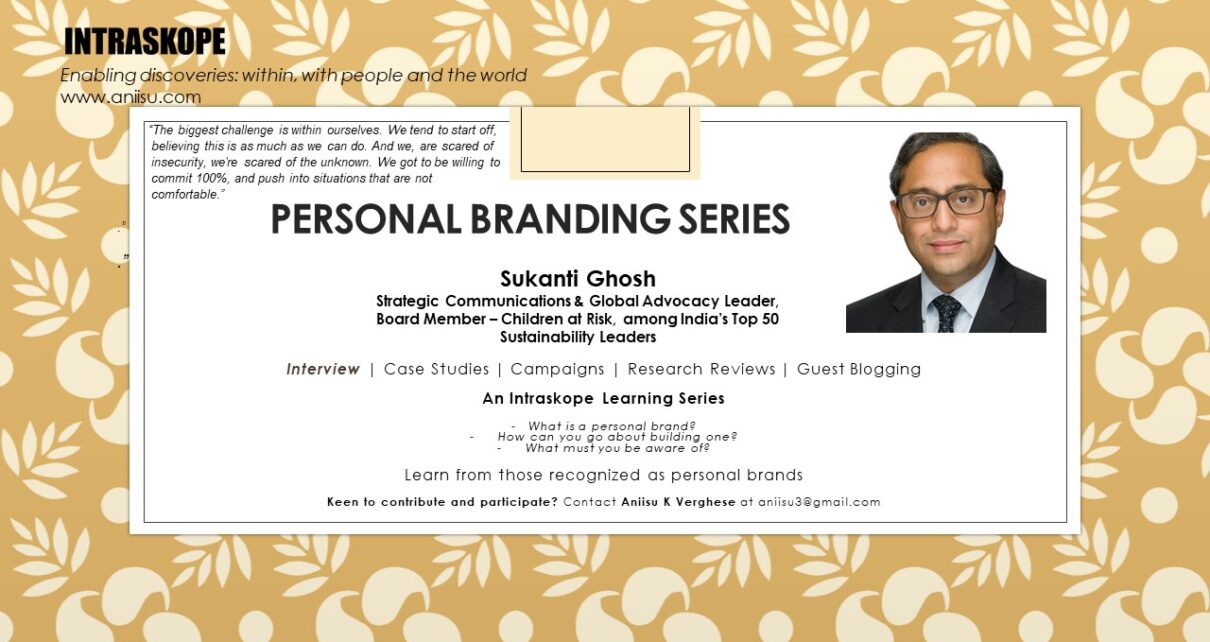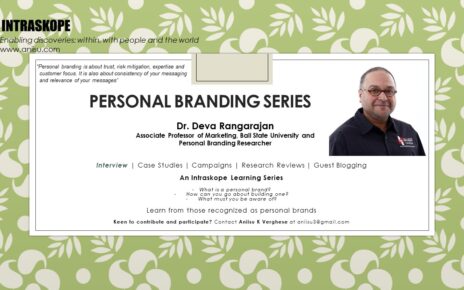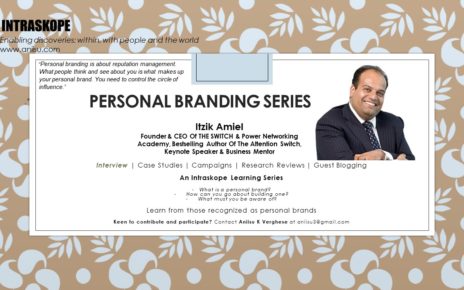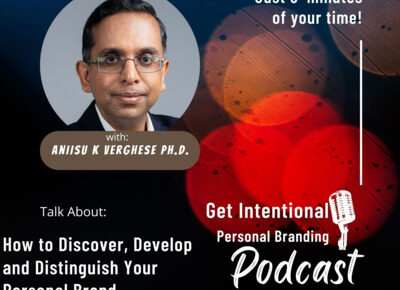Sukanti Ghosh is among the foremost authorities on crisis communications and advocacy apart from being a great mentor to many, including me.He hassignificant experience advising C-suite executives through organizational change, in support of international market access, consolidation, crises, reputation management, commercialization of business offerings, and policy change communication initiatives. A Past Member of the National Executive Board, American Chamber of Commerce (AmCham), Indi and a global jury member for the most prestigious industry awards including the Public Affairs Asia and the IABC Houston Bronze Quill Awards, Sukanti is a model for those wanting to balance work priorities and that of the community. He serves as a Board member for a charity – Children at Risk. Sukanti is the Senior Vice President at the Albright Stonebridge group, the global the premier global consulting firm set up by former US Secretary of State Madeleine Albright, and former US Commerce Secretary Carlos Gutierrez. He leads the South Asia practice as the Senior Vice President and lead for the region.
“Each one of us has a personal brand. It is much the same. We don’t think we enough about our own careers. We don’t think purposefully enough about our own jobs or our own lives. So, to me, personal branding is not about how many viewers I have, or the followers I have on Twitter or Instagram. It’s about what am I, what am I doing with my life. how intentional am I with my choices.”, says Sukanti.
Watch the YouTube video interview and read the complete interview below. Look up more such stories on my YouTube channel and on LinkedIn.
- What according to you is personal branding?
Well, contrary to what a lot of people say, I believe there are strong alignments between the fundamental construct of brands. There are lots and lots of definitions, but I think the one that resonates with me the most is – a brand is a promise. The fact is that, each one of us stands for certain values, ethics and qualities that we are bestowed upon us by our parents, and which we learn to adopt, live up to and are consistently recognized by. This is the first layer of our personal brand, On top of this, we add layers upon layers of experiences, choices and the environments that we surround ourselves with, as we grow older and evolve. The sum total of these values, ethics and experiences define us as personal brands. What’s noteworthy is that while most of us do a good job of planning the positioning the companies and brands we work with we hardly ever purposefully think of ourselves as brands or in the same intentional manner. We hardly ever think of ourselves in the same context of short-term, medium-term and long-term goals; goals that need to be periodically revisited and adjusted as we pass through life.
2. Do you consider yourself a personal brand? How do you know it?
Personally speaking, my career has been through several phases: the first had to do with communications in the broadest sense of the term. What very few people know is that I started off my career as a broadcaster on All India Radio. In the early days of my career, In addition to 10 years of programming on All India Radio, Kolkata – while studying in college and through the first couple of years at work – I also worked as a researcher, scriptwriter and presenter of special features and documentaries for Doordarshan at the local, National and SAARC levels. And, then through my first two full-time jobs, I was actively contributing to 14 newspapers around the country, with my own byline. My first two jobs were a five-year stint with Contract Advertising, where I helped set up and spearhead their public relations department, and a second five-year stint with TBWA Anthem in Delhi when I helped them set up and successfully run their public relations practice nationwide. The second phase of my career was in banking and financial services – first with the leading Gulf Bank, BankMuscat SAOG, and then, with Barclays Bank in India. Both had broad country remits with strong regional overtones. This was a tumultuous time to be in banking, with aggressive, even exponential growth, a substantial amount M&A activity, multiple operational crises and then, the global financial crisis. The third phase saw me returning to consulting, but in an elevated role and with a substantially different focus, The point that I am making is that I have tried to be as intentional and deliberate about each of these transitions. I sought to use the knowledge and experiences of the past to forge the future. I have invested in in each of the jobs I have taken because I believe that you need to give yourself time understand the organization you work for, settle down, then making a meaningful contribution.
How do you know if you are making progress along your chosen path? One of the first things you should ask yourself is ‘how important is my role in the grand scheme of things?’. I don’t mean in terms of where you are in the organization hierarchy. I’m talking about how central it is to make a meaningful difference. At the same time, are you being intellectually challenged? If you’re not being intellectually challenged in your current role or wake up every morning and don’t feel excited about going to work, it is possibly time you moved on. Our profiles or our CVs are nothing but a collection of milestones. Go about collecting them. Remember that every day you are a day closer to being made redundant if you aren’t challenging yourself.
3. What does one do to go about building a personal brand?
I think consulting is a brilliant way to start your career. It provides a very steep learning curve and keeps you nimble and on your toes. It helps when you realize that you’ve got a target on your head and that you’re only as good as your last project or initiative. So, you have to deliver, If you’re the kind of person who is hungry for knowledge, goal-oriented, organized and performs well under pressure, you’re made for consulting and are likely to see considerable personal growth very quickly.
However, to be truly successful in a consulting career, I believe it is equally important to see things from within a corporation as it is only then that you really appreciate how businesses function and the constraints they operate under. When you haven’t don’t this, you only understand part of the problem, and really don’t live the problem as they do. My move to the corporate side of things was very deliberate as I felt I needed to deepen my understanding of the industry I had chosen to be a part of – an industry I felt played a significant role in the markets and economies I would be operating in, banking and financial services. Close to eight years after, my move back to consulting was equally intentional.
These weren’t goals that were set on the spur of the moment or because I had tired of my existing mandate. These were career goals that I’d set for myself very clearly on in my career. Goals that were supplemented by the need to periodically update my knowledge base. This is what prompted me to go back to school, between 2008 and 2010, when I wanted to test myself against some of the best mid-career strategic communications and public affairs practitioners in the world. And when I came away from that experience, I was sure I needed a new canvas to use the new armory of skills I had picked up during the program.
4. What are the attributes of a personal brand? And what do people associate your brand with?
You should ask the people who know me or have seen me over the years! It would be unfair of me to anticipate what they would say. If I have to guess, I think most people would say ‘trustworthy’ and ‘problem solver’ are the two attributes closet to my personal brand. Besides this, I think there are lots of people who think crisis is my middle name, as I have been called into some of the biggest and most complicated crises throughout my career.
5. Based on your observations and learning who according to you is a personal brand? What characteristics do you admire about them?
I’ve been extremely fortunate to find several mentors throughout my career. These are people who despite their impossibly busy schedules have always found time for me when I needed a patient ear. I have been comfortable talking to them about what keeps me up at night, the options before me, the career choices I am about to make or the issues I am struggling with, and I have always welcomed their deliberate, honest and candid feedback. They’ve urged me to push myself to think beyond my limits and strive for new levels of excellence. Some of the people I owe a lot to include Ananya Banerjee, Aditi Roy Ghatak, Ram Sehgal, George John, Ahmed Al-Abry, J. Sunder George, Margery Kraus, Brad Staples, Tim Roemer, Carlos Gutierrez and Lalit Mansingh. It’s been a very humbling experience. I’m deeply grateful to each one of them for helping me become who I am today.
6. What challenges did you face while building a personal brand? What techniques did you use?
I think the biggest challenge to our personal brands is us, ourselves. We tend to start off believing that this is as much as we can do. We fear insecurity, fear failure, and are scared of the unknown. And to be honest, you have to be willing to commit yourself 100% to a goal, to push yourself into situations that are not comfortable, to grow as a person and succeed. You must be willing to surround yourself with people who are better than you. Even if there are junior colleagues, you should be ready to acknowledge that they know more about something than you do and be willing to learn from them. So, I think, your biggest detractor, your biggest obstacle in your personal journey, is yourself. The belief that you cannot do something even without trying to do it; the belief that it’s pointless to do something, because it won’t happen; and, the question to yourself as to why you should then do it, is what stops us short each and every time.
You’ve got to get out of all of that shell. The impression that you are a leader, and everybody’s got to pay homage to you, is nonsense. You’ve got to be willing to learn and grow with people. The final thing that I will say is never rest on your laurels. Every journey, every step is a step forward. One you must take and keep on taking in order to reach your goals.
7. What did you gain in the process? What did you lose?
As someone who was born in one country, studied in four countries, has lived in five countries and worked across many more, I can say that I have tested all my friendships and relationships to the hilt while learning from an incredibly rich mosaic of cultures and experiences. There was a point in time in my career, when a good work week for me was two flights a week, an average week was four flights, and there were extended periods of time when I’ve been on eight to 10 flights – both domestic and international – every single week. During these times, the quality of time I have been able to spend with my family has definitely suffered. To be able to do this and keep your balance, you’ve got to have an extremely supportive spouse or partner, and a family that’s willing to join you on this journey. Otherwise, this quest can make for an extremely lonely, somewhat disappointing personal life. That being said, I’ve been blessed with a wonderful family that is supportive, participative, and eager to embrace the challenges life has thrown at us shoulder to shoulder with me. But then, there comes a time when you’ve got to make a judgement call as say enough is enough. I certainly did.
8. How can someone starting from scratch build a personal brand? What is the first step he or she must take?
I always say, reach for the stars. Without these dreams, life is not worth living. There are millions of people who are extremely happy living and staying in one city, one town or in one village all their lives and I envy them. I think they’ve got really fabulous lives. But that’s not for me. You need to know yourself and know what you really want to achieve. If you really want to reach the stars, there’s nothing and nobody apart from yourself that can stop you from getting there with the right degree of hard work and effort.
9. What is your recipe for personal branding success?
I think I’ve had a fabulous career and a fabulous life, for which I feel truly blessed. And yet, through all of this, I would like to believe that I have been able to keep my feet firmly planted on the ground, and my eyes set on a fresh set of goals that are both relevant and commensurate to my current station and situation in life. You really can’t afford to stop and take things for granted. It’s important to be authentic and consistent to who you are, and to know what defines you. The secret sauce emerges from an enduring sense of gratitude to not only the people you’ve known, but the experiences you’ve had, the memories you’ve built, and the relationships you’ve cherished. It is critical to know who you truly are and what you’ve set out to do in your life, so spend as much time as you need to arrive at these conclusions for yourself.
10. Who according to you are personal brands whom others can follow and learn from? With COVID19 and other crises what steps can personal brands take?
Inspiration, I believe, is an intensely personal choice, and one that I definitely wouldn’t like to impinge upon and dictate. I believe it is possible to have multiple ‘mentors’ at the same time as you travel though life. Personal brands and brands are general really have an opportunity to come to the fore during a crisis Covid-19 is certainly no exception!
Liked this interview? Please do share your feedback and comments.
Keen to get ahead with your personal brand? Here are some resources:
- Take a FREE assessment on personal branding.
- Refer to the 3C model on Personal Branding
- Sign up for a 60-minute personalized chat on personal branding
- Personal branding for corporate communicators
Missed the earlier episodes? Read the interviews with Muqbil Ahmar, Tinu Cherian Abraham, Joseph Fernandez, Christina Daniels,Karthik Srinivasan,Gautam Ghosh, Alexander Michael Gittens, Mubeen Azeez, Itzik Amiel, Mangal D Karnad, Abhijit Bhaduri, Sandeep K Krishnan PhD, Scott Shirai, Sunil Robert, Latha Vijaybaskar PhD, Abha Maryada Banerjee and Dr. Amit Nagpal online and share your thoughts.
Keen to join this Series and share your thoughts on Personal Branding? Write to me at [email protected]
Please subscribe to my YouTube Channel and follow me on Medium.



